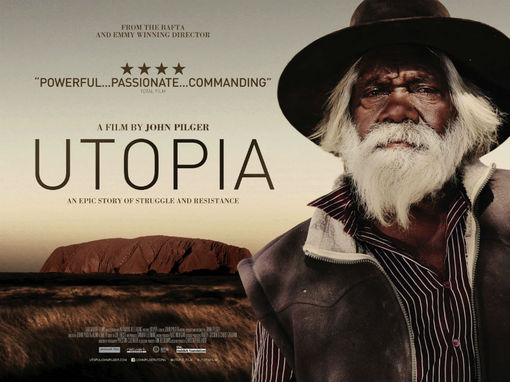UTOPIA SCREENINGS: JANUARY to MARCH 2014
|
Over January, February and March the Nyoongar Tent Embassy and the Green Left Weekly teamed up to present a series of FREE screenings of John Pilger's latest film:UTOPIA.
Screenings were held at the Perth Activist Centre & Fremantle Workers Club at the following times: 2:30pm Saturday 25th January 6pm Saturday 25th January 6pm Thursday 30th January 2:30pm Saturday 1st February 6pm Saturday 1st February 2:30pm Saturday 8th February 6pm Saturday 8th February 6:30pm Wednesday 26th February 3pm Thursday 13th March Over 700 people attended the packed out screenings. You can find out more about Utopia and the screenings by checking out the facebook event: https://www.facebook.com/events/1443211595895361/1443236092559578/?notif_t=plan_mall_activity Here's a video of Marianne Headland Mackay speaking before a screening: https://www.facebook.com/photo.php?v=529905760441237 To find out about more screenings around Australia visit the Utopia website: http://utopiajohnpilger.co.uk/showings REVIEW: www.greenleft.org.au/node/55637 |
"A new John Pilger film about Australia, Utopia, commissioned by ITV and backed by the UK company, Network Distributing, and produced by Dartmouth Films, will be released in UK cinemas on 15 November 2013.
The launch of the film in Australia will consist of special screenings at the Museum of Contemporary Art (MCA) in Sydney, leading up to 'Australia Day' on 26 January 2014, followed by a cinema release.
Utopia is a vast region in northern Australia and home to the oldest human presence on earth. "This film is a journey into that secret country," says Pilger in Utopia. "It will describe not only the uniqueness of the first Australians, but their trail of tears and betrayal and resistance - from one utopia to another".
Pilger begins his journey in Sydney, where he grew up, and in Canberra, the nation's capital, where the national parliament rises in an affluent suburb called Barton, recently awarded the title of Australia's most advantaged community.
Barton is named after Edmund Barton, the first prime minister of Australia, who in 1901 introduced the White Australia Policy. "The doctrine of the equality of man," said Barton, "was never intended to apply to those who weren't British and white-skinned." He made no mention of the original inhabitants who were deemed barely human, unworthy of recognition in the first suburban utopia.
One of the world's best kept secrets is revealed against a background of the greatest boom in mineral wealth. Has the 'lucky country' inherited South African apartheid? And how could this happen in the 21st century? What role has the media played? Utopia is both a personal journey and universal story of power and resistance and how modern societies can be divided between those who conform and a dystopian world of those who do not conform.
Utopia draws on people and places Pilger first filmed 28 years ago during his long association with the indigenous people of his homeland. The evidence he produces is often deeply moving and shocking.
Utopia is produced by Dartmouth Films and released in association with Network Releasing. The cinema release is Friday 15 November 2013. ITV will broadcast Utopia in December 2013. A DVD with an extraordinary collection of interviews and sequences not included in the final cut of the film will be released by Network at the same time.
In an article for the Guardian, John Pilger gives a taste of the latest film about Australia, his homeland - the first was The Secret Country, broadcast in 1985."
http://johnpilger.com/articles/australias-boom-is-anything-but-for-its-aboriginal-people
The launch of the film in Australia will consist of special screenings at the Museum of Contemporary Art (MCA) in Sydney, leading up to 'Australia Day' on 26 January 2014, followed by a cinema release.
Utopia is a vast region in northern Australia and home to the oldest human presence on earth. "This film is a journey into that secret country," says Pilger in Utopia. "It will describe not only the uniqueness of the first Australians, but their trail of tears and betrayal and resistance - from one utopia to another".
Pilger begins his journey in Sydney, where he grew up, and in Canberra, the nation's capital, where the national parliament rises in an affluent suburb called Barton, recently awarded the title of Australia's most advantaged community.
Barton is named after Edmund Barton, the first prime minister of Australia, who in 1901 introduced the White Australia Policy. "The doctrine of the equality of man," said Barton, "was never intended to apply to those who weren't British and white-skinned." He made no mention of the original inhabitants who were deemed barely human, unworthy of recognition in the first suburban utopia.
One of the world's best kept secrets is revealed against a background of the greatest boom in mineral wealth. Has the 'lucky country' inherited South African apartheid? And how could this happen in the 21st century? What role has the media played? Utopia is both a personal journey and universal story of power and resistance and how modern societies can be divided between those who conform and a dystopian world of those who do not conform.
Utopia draws on people and places Pilger first filmed 28 years ago during his long association with the indigenous people of his homeland. The evidence he produces is often deeply moving and shocking.
Utopia is produced by Dartmouth Films and released in association with Network Releasing. The cinema release is Friday 15 November 2013. ITV will broadcast Utopia in December 2013. A DVD with an extraordinary collection of interviews and sequences not included in the final cut of the film will be released by Network at the same time.
In an article for the Guardian, John Pilger gives a taste of the latest film about Australia, his homeland - the first was The Secret Country, broadcast in 1985."
http://johnpilger.com/articles/australias-boom-is-anything-but-for-its-aboriginal-people

